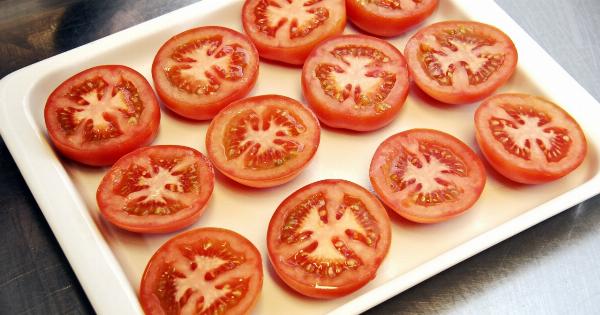Consuming a variety of fruits and vegetables is essential for maintaining a healthy diet. However, some individuals may experience bloating after consuming certain types of fruits and vegetables.
Bloating is the uncomfortable feeling of fullness or tightness in the abdomen, often accompanied by gas. While bloating can be caused by various factors, including overeating or digestive disorders, certain fruits and vegetables are known to exacerbate symptoms.
In this article, we will discuss some images of the fruits and vegetables that can potentially cause bloating and discomfort in susceptible individuals.
1. Apples
 .
.
Apples are undoubtedly a popular fruit, known for their crisp texture and refreshing taste. They are packed with vitamins, minerals, and fiber, making them a nutritious choice for many.
However, apples are also high in fructose, a naturally occurring sugar that can be difficult to digest for some individuals. For those with fructose intolerance or sensitivity, consuming apples can lead to bloating and other digestive issues.
2. Watermelon
 .
.
Watermelon, especially during the summer season, is a favorite fruit for many due to its high water content and sweet flavor.
However, watermelon can cause bloating in certain individuals due to its high FODMAP (fermentable oligosaccharides, disaccharides, monosaccharides, and polyols) content. The natural sugars in watermelon can ferment in the gut, leading to gas and bloating.
3. Cruciferous Vegetables
 .
.
Cruciferous vegetables, including broccoli, cabbage, cauliflower, and Brussels sprouts, are highly nutritious and often recommended for their health benefits.
However, they contain a carbohydrate called raffinose, which can be challenging for the body to break down completely. When consumed in large quantities, these vegetables can cause bloating and gas due to this undigested carbohydrate.
4. Avocados
 .
.
Avocados are rich in healthy fats, vitamins, and minerals, making them a popular addition to salads, sandwiches, and smoothies. However, their high fiber content, particularly insoluble fiber, can cause bloating and digestive discomfort in some people.
Additionally, avocados contain a type of sugar called polyols, which can ferment in the gut and lead to bloating and gas.
5. Peaches
 .
.
Peaches are delicious and juicy fruits with a host of health benefits. They are a great source of vitamins, minerals, and antioxidants.
However, they also contain high levels of sorbitol, a sugar alcohol that can cause bloating, especially when consumed in excess. Individuals with sensitivity to sorbitol may experience digestive issues such as bloating, gas, and diarrhea after consuming peaches.
6. Onions
 .
.
Onions are widely used in cooking for their strong flavor and aroma. However, they are known to contain high amounts of fructans, a type of carbohydrate that is not digested well by some individuals.
Fructans can ferment in the gut, leading to bloating, gas, and other digestive discomforts. Cooking onions thoroughly can help reduce the fructan content and make them more tolerable for those who are sensitive.
7. Bananas
 .
.
Bananas are a popular fruit worldwide, known for their potassium content and convenient packaging. They are generally well-tolerated, but some people may experience bloating after consuming bananas.
This may be due to their high fructose content or the presence of resistant starch, which is a type of fiber that some individuals have difficulty digesting. Ripe bananas tend to be better tolerated as the starch content decreases during ripening.
8. Bell Peppers
 .
.
Bell peppers, available in various colors, are not only vibrant and flavorful but also packed with vitamins and antioxidants.
However, they belong to the nightshade family, which contains compounds called alkaloids that can trigger digestive issues in susceptible individuals. For some people, consuming bell peppers can result in bloating, gas, and even stomach pain.
9. Beans and Legumes
 .
.
Beans and legumes, such as lentils, chickpeas, and kidney beans, are excellent sources of plant-based protein and fiber. However, they also contain oligosaccharides, a type of carbohydrate that is not digested well in the small intestine.
Instead, these compounds pass into the large intestine, where they are fermented by gut bacteria, leading to gas production and bloating. Soaking, sprouting, or cooking beans thoroughly can help reduce these effects.
10. Cabbage
 .
.
Cabbage is a versatile vegetable often used in salads, slaws, and stir-fries. While it is low in calories and rich in nutrients, cabbage can be a common culprit for causing bloating in some individuals.
It contains sulfur compounds that can be challenging to digest, leading to gas and bloating. Lightly cooking cabbage or opting for fermented cabbage, such as sauerkraut, may help improve its digestibility.
If you experience bloating or any other digestive discomfort after consuming these fruits or vegetables, it may be worth considering your tolerance levels and exploring alternative options.
Remember, everyone’s digestive system is unique, and what causes bloating in one person may not affect another. Experimenting with portion sizes, cooking methods, and different combinations of fruits and vegetables can help identify which ones work best for you.































